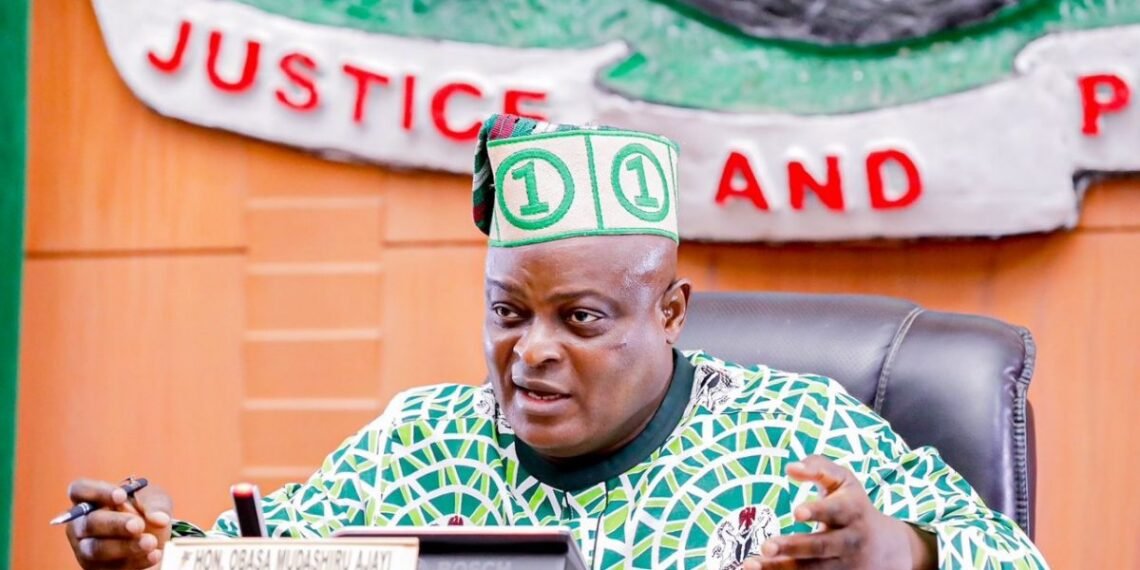In a seismic shift that has left Lagos political circles abuzz, Mudashiru Obasa, Speaker of the Lagos State House of Assembly since 2015, was impeached on January 13, 2025. The development, which culminated in the appointment of Mojisola Meranda as the first female Speaker of the Assembly, was laden with allegations of corruption, power struggles, and political intrigue. This move not only marks the end of Obasa’s controversial tenure but also sets the stage for a new era in Lagos’ political landscape.
Allegations and Fallout
Obasa’s impeachment was driven by a litany of accusations ranging from financial impropriety to abuse of office. Chief among these was the alleged withdrawal of ₦43.5 billion for “backup vehicles” for lawmakers, a figure that raised significant alarm over the Assembly’s fiscal management. Additionally, rumors of questionable expenditures, including a ₦17 billion gate construction and a ₦200 million Thanksgiving service, painted a picture of reckless financial oversight under his leadership.
While Obasa dismissed these allegations as politically motivated, his defense failed to convince a majority of the Assembly members. During his absence in Atlanta, United States, a decisive session saw 32 out of 40 lawmakers voting to oust him. The Assembly’s Deputy Chief Whip, Fatai Mojeed, was subsequently elevated to Deputy Speaker, while all standing committees and principal positions were dissolved, signaling a clean slate for the legislative body.
A Speaker’s Ambitions and Missteps
Obasa’s downfall was not merely the result of alleged misconduct. Political observers have noted that his growing ambition to succeed Governor Babajide Sanwo-Olu in the 2027 elections may have alienated key power brokers within Lagos politics. During the governor’s 2025 budget presentation, Obasa made remarks hinting at his readiness to contest the gubernatorial seat. His declaration that “those who have been before me are not better off” reportedly ruffled feathers among Lagos’ political elite.
Read Also: Group tackles Lagos Assembly member over poor representation
His perceived arrogance did not go unnoticed. Sources revealed that influential figures, including members of the Governor’s Advisory Council (GAC), raised concerns about Obasa’s behavior during a meeting with President Bola Ahmed Tinubu. Reports suggest that Tinubu, a central figure in Lagos politics, admonished Obasa for disrespecting the governor and mishandling legislative affairs. This marked a turning point, as the political machinery in Lagos began moving against him.
The President’s Influence
President Tinubu’s intervention added weight to the growing dissent against Obasa. During a festive meeting with the GAC, Tinubu was reportedly briefed on several instances where Obasa undermined the governor’s authority. One such instance involved a controversial bill seeking to grant the Assembly power to sack the chairman of the Lagos State Independent Electoral Commission. Tinubu allegedly dismissed the bill as a “huge joke,” further diminishing Obasa’s standing.
Insiders claim that even a private plea by Obasa to Tinubu after the meeting failed to salvage his position. The president, along with other GAC members, remained resolute, signaling the beginning of the end for the embattled Speaker.
Public and Political Reactions
Obasa’s impeachment has elicited mixed reactions. While some view it as a necessary step towards accountability, others see it as a politically orchestrated takedown. Assembly staff reportedly celebrated his removal, citing neglect of their welfare. Fouad Oki, a chieftain of the All Progressives Congress (APC), described Obasa’s leadership as imperial, stating that his removal was long overdue for the Assembly’s stability.
Social media has been awash with commentary, with many Nigerians debating the implications of the impeachment. For some, it represents a shift in Lagos politics, where no individual is untouchable, regardless of their perceived influence.
A New Dawn for the Lagos Assembly
The swift election of Mojisola Meranda as Speaker signals a strategic pivot for the Assembly. As the first female Speaker in Lagos history, her leadership marks a historic milestone. Meranda, known for her experience in governance and public administration, faces the enormous task of restoring the Assembly’s credibility and addressing lingering challenges.
Her immediate focus will likely be on uniting the lawmakers and rebuilding trust with Lagosians, who have become increasingly disillusioned with the state’s legislative affairs. Her election also shows a coordinated effort among lawmakers to reset the Assembly’s trajectory following months of controversy.
Ethical and Legal Questions
The impeachment process, while constitutionally valid, has raised questions about the speed and manner in which it was executed. Critics have argued that the process appeared more politically motivated than ethically driven. However, the two-thirds majority required for impeachment under Nigerian law was reportedly achieved, suggesting procedural compliance.
Nonetheless, the controversy underscores the need for reforms that prioritize transparency and accountability in governance. The Lagos Assembly, under Meranda’s leadership, has an opportunity to demonstrate its commitment to these principles.
Mudashiru Obasa’s impeachment marks the end of a tenure fraught with controversy and intrigue. While his nine-year reign saw him navigating numerous allegations and political battles, his ultimate downfall was a convergence of ambition, mismanagement, and shifting political allegiances.
For Lagos State, this moment offers a chance to redefine its legislative priorities and address the systemic issues that led to Obasa’s removal. As the state moves forward, the ripple effects of this impeachment will continue to shape its political narrative, providing lessons for governance and power dynamics in Nigeria.
In the end, Obasa’s story serves as a cautionary tale of how ambition, unchecked power, and a lack of accountability can lead to political undoing, even for those who once seemed invincible.






